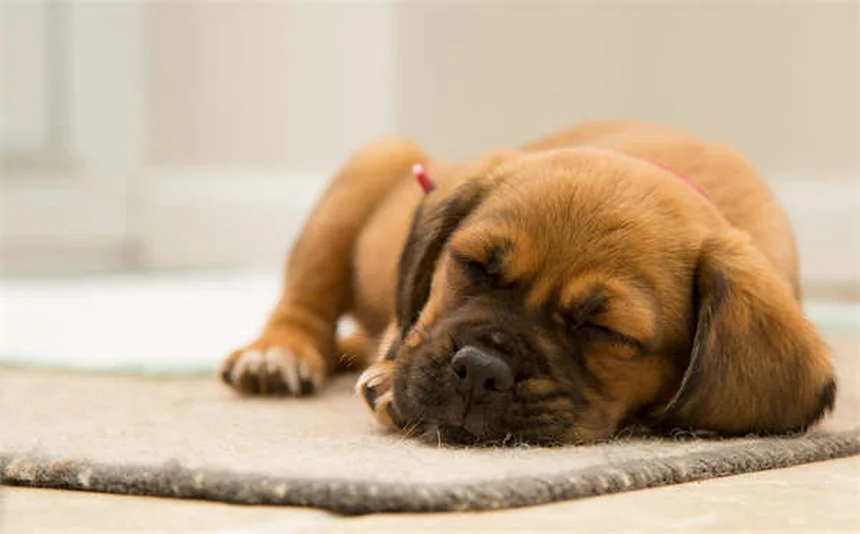Advertisement
Why do cats sleep on your head? The answer is simple: your feline friend absolutely adores you! When your cat chooses your head as their favorite sleeping spot, it's their way of showing trust, seeking warmth, and staying close to your unique scent. I've been a cat parent for years, and let me tell you - that purring alarm clock on your pillow is actually giving you the highest compliment a cat can offer!You might think it's just about comfort (and sure, your head makes a great warm spot), but there's so much more to this quirky behavior. From marking you with their scent to keeping tabs on your movements, your cat has some pretty clever reasons for turning your hair into their personal bed. We'll break down exactly what's going through your kitty's mind when they claim your head as their territory every night.
E.g. :Can Cats Get Cold? 5 Signs Your Feline Is Too Chilly
- 1、Why Does My Cat Think My Head Is the Best Bed Ever?
- 2、The Science Behind the Snuggles
- 3、Should You Become a Cat Pillow?
- 4、Training Tips for Head-Shy Humans
- 5、The Final Verdict on Feline Headrests
- 6、The Secret Language of Cat Cuddles
- 7、The Unexpected Benefits of Being a Cat Pillow
- 8、When the Head Becomes a Playground
- 9、The Cultural History of Cats and Humans Sleeping Together
- 10、Your Cat's Sleeping Habits and What They Reveal
- 11、FAQs
Why Does My Cat Think My Head Is the Best Bed Ever?
Picture this: you're all cozy in bed, ready to drift off to dreamland, when suddenly - plop - your feline friend decides your head makes the perfect pillow. Sound familiar? Let's unpack this quirky cat behavior together!
The Ultimate Compliment From Your Furry Friend
When your cat chooses your head as their sleeping spot, they're basically giving you a five-star Yelp review for being an awesome human. This is their way of saying "I trust you completely" - which, coming from a creature that's naturally cautious, is pretty special.
Think about it from their perspective: sleeping makes them vulnerable. By curling up on your head, they're putting their safety in your hands (or rather, under your hair). It's like when you were a kid and felt safest sleeping in your parents' bed during a thunderstorm - same concept, just furrier!
Heat-Seeking Missiles (The Cuddly Kind)
Here's a fun fact: your head is like a personal space heater for your cat. While the rest of your body might be bundled under blankets, your head stays exposed - making it the perfect warm spot for your heat-loving kitty.
Check out how different body parts compare in heat retention:
| Body Part | Heat Retention | Cat Appeal |
|---|---|---|
| Head | High (exposed) | ★★★★★ |
| Feet | Medium (often covered) | ★★★☆☆ |
| Torso | Low (fully covered) | ★☆☆☆☆ |
The Science Behind the Snuggles
 Photos provided by pixabay
Photos provided by pixabay
You Smell Like Home
Ever notice how your cat rubs against your legs when you come home? That's scent marking - and your head is basically scent central. Our scalps produce oils that carry our unique smell, which cats find comforting.
Here's a cute thought: when your cat sleeps on your head, they're creating a shared scent profile. It's like mixing your favorite playlist with your best friend's - you're creating something that represents both of you!
The Ultimate Alarm System
Did you know your cat might be using your head as their personal monitoring station? By positioning themselves there, they can:
- Feel when you move (so they don't miss breakfast)
- Wake you easily with gentle paw taps
- Keep tabs on your breathing patterns
It's like having a tiny, furry security guard who works for treats!
Should You Become a Cat Pillow?
The Purr-fect Bonding Experience
Letting your cat sleep on your head can actually strengthen your bond. That nightly head-squishing ritual releases oxytocin (the "love hormone") in both of you. Pretty sweet deal for some minor hair flattening, right?
But here's the million-dollar question: Is this arrangement working for both of you? If you're waking up with cat hair in your mouth or struggling with allergies, it might be time to reconsider. Your comfort matters too!
 Photos provided by pixabay
Photos provided by pixabay
You Smell Like Home
Some red flags that it's time to relocate your feline:
- You're developing a sneeze that rivals a trumpet solo
- Your sleep quality has gone downhill
- Your cat treats your face like a trampoline at 3 AM
Remember - a well-rested human makes for a better cat servant... I mean, companion!
Training Tips for Head-Shy Humans
Creating Alternative Sleeping Spots
Want to keep the cuddles without the cranial compression? Try these tricks:
1. The Decoy Pillow: Place a heated pet bed or soft blanket near your head. The warmth will attract your cat while saving your hairstyle.
2. The Pre-Bed Play Session: Tire out your kitty with 15 minutes of intense play before bedtime. A sleepy cat is less likely to seek out your head!
Positive Reinforcement Works Wonders
Cats respond best to encouragement, not punishment. When they choose their own bed over your head:
- Offer their favorite treats
- Give gentle praise and pets
- Try a calming pheromone spray on their bed
Pro tip: Consistency is key! It might take a few weeks for new habits to stick.
The Final Verdict on Feline Headrests
At the end of the day (or rather, at bedtime), whether you allow the head-squishing comes down to personal preference. Some people love waking up to purrs in their ear, while others prefer breathing freely through the night.
Here's what I've learned from years of being a human cat bed: these quirky behaviors are what make our relationships with cats so special. Whether your feline prefers your head, your feet, or that one square inch of bed you thought was yours, it's all about the unique bond you share.
Now if you'll excuse me, I need to go fluff my pillow... and by fluff, I mean remove the cat currently occupying it!
The Secret Language of Cat Cuddles
 Photos provided by pixabay
Photos provided by pixabay
You Smell Like Home
You know how teenagers claim their spot on the couch with backpacks and phones? Cats do the same thing - just with their whole bodies! When your kitty plops on your head, they're basically putting up a "Mine!" sign in cat language.
This territorial behavior goes way back to their wild ancestors. In multi-cat households, the dominant feline often claims the highest sleeping spot. So when your cat chooses your head, they might be saying "I'm the boss of this human!" But don't worry - it's a compliment wrapped in fur. They see you as part of their safe space, their personal mountain to conquer every night.
The Emotional Thermometer of Your Cat
Ever notice how your cat's sleeping position changes with their mood? Here's a quick guide to what those head-squishing sessions really mean:
| Sleeping Position | What It Means | Your Comfort Level |
|---|---|---|
| Full head hug | Ultimate trust and affection | ★☆☆☆☆ (but adorable!) |
| Cheek nuzzle | Comfort-seeking behavior | ★★★☆☆ |
| Paws on forehead | "I own you" mixed with warmth-seeking | ★★☆☆☆ |
But here's something fascinating: Why do some cats prefer certain people's heads over others? It often comes down to your daily routine. If you're the one who feeds them or plays with them most, you've basically won the feline lottery for prime sleeping real estate!
The Unexpected Benefits of Being a Cat Pillow
Your Personal Stress Reliever
That purring sound vibrating through your skull at 3 AM? Turns out it's nature's white noise machine! Studies show cat purrs fall between 20-140 Hz - frequencies known to promote healing and reduce stress in humans.
Think about it - when was the last time you stayed mad while a warm, purring ball of fluff melted onto your head? Exactly! It's impossible. Your cat might be doing you a favor by turning bedtime into a free therapy session. Just try not to laugh when their whiskers tickle your ear!
A Built-in Alarm Clock (That Actually Works)
Forget those jarring smartphone alarms - cats have perfected the gentle wake-up call. When they're ready for breakfast, you'll get the most creative morning routines:
- The "gentle" face pat (claws retracted... mostly)
- The dramatic sigh right in your ear
- The strategic hair pull (just enough to get attention)
And here's the funny part - they've probably trained you better than you've trained them. You jump up to feed them at the first sign of paw-to-face contact, proving their methods work perfectly!
When the Head Becomes a Playground
Midnight Zoomies and Your Hair
One minute you're peacefully sleeping, the next - BAM! - your cat decides your head is the starting line for their nightly marathon. Why do they do this? It's all about those predator instincts kicking in when the house gets quiet.
Your moving head under the covers suddenly becomes the most exciting "prey" in the room. And let's be honest - your startled reaction probably encourages the behavior. They think, "Wow, human responds every time! Best game ever!" It's like playing peek-a-boo with a toddler who never gets tired of it.
The Great Escape Plan
If the nighttime acrobatics become too much, here's a pro tip: keep a stuffed animal near your pillow. When the crazies start, toss it across the room. Your cat will likely chase it, giving you at least... oh, about 3 minutes of peace before round two begins!
But really, isn't this what makes cat ownership so special? One minute they're treating your head like their personal throne, the next they're attacking your toes under the blanket. Living with cats is never boring - it's like having a tiny, furry roommate who pays rent in cuddles and comedy!
The Cultural History of Cats and Humans Sleeping Together
From Ancient Egypt to Your Bedroom
This head-sleeping habit isn't new - we've got historical evidence going back thousands of years! Egyptian tomb paintings show cats curled around their owners' heads, and medieval Europeans often let cats sleep in their beds for warmth (and pest control).
Fast forward to today, and we're still making the same compromises with our feline overlords. The main difference? Now we have Instagram to document every ridiculous sleeping position they invent!
Global Sleeping Habits Compared
Did you know sleeping arrangements with cats vary worldwide? In Japan, many cats sleep in special heated pet beds, while in rural areas they often share futons. American cats seem particularly fond of human heads, while British cats reportedly prefer curling at their owners' feet.
This makes me wonder: Do cats in different countries develop cultural sleeping preferences? It's possible! Just like humans learn local customs, cats adapt to their environment's sleeping arrangements. Your cat didn't invent head-squishing - they're just continuing a proud feline tradition!
Your Cat's Sleeping Habits and What They Reveal
The Napping Schedule of a Tiny Tiger
Ever notice how your cat seems to sleep all day but turns into a ninja at bedtime? That's because cats are crepuscular - most active at dawn and dusk. When they crash on your head at night, they're actually between hunting cycles.
Here's what a typical cat's 24-hour schedule looks like:
- 3 AM: Extreme parkour session (using your face as launchpad)
- 5 AM: Power nap (on your forehead)
- 7 AM: Breakfast alarm service (paw to eyeball)
- 9 AM-5 PM: Beauty sleep (various locations)
Basically, your head becomes their recharge station between bursts of nighttime activity. Think of it as their version of plugging in a phone - except you're the charger!
When to Worry About Sleeping Patterns
While most head-squishing is normal, sudden changes in sleeping habits can signal health issues. Keep an eye out for:
- Sleeping way more than usual (could indicate illness)
- Struggling to get comfortable on your head (might mean joint pain)
- Excessive nighttime activity (could suggest thyroid problems)
Remember, you know your cat best. If their sleeping routine changes dramatically, it's worth a vet visit. After all, we want to keep our personal head warmers happy and healthy!
E.g. :Why does my cat insist on taking up my pillow when I'm sleeping on ...
FAQs
Q: Is it bad to let my cat sleep on my head?
A: It depends on your personal comfort and health! While there's nothing inherently wrong with this sleeping arrangement, you should consider a few factors. If you have cat allergies, having their fur right by your face all night might worsen symptoms like sneezing or itchy eyes. Light sleepers might find the purring and movement disruptive. However, if neither of these applies to you, letting your cat sleep on your head can actually strengthen your bond through shared warmth and comfort. Just be prepared for some interesting bedhead in the morning!
Q: Why does my cat only sleep on my head and no one else's?
A: Congratulations - you've been specially chosen! Cats often pick one favorite person in the household, and your head might represent the perfect combination of your unique scent, body heat, and the trust you've built together. Maybe you're the one who feeds them most often, or perhaps they've decided your shampoo smells particularly interesting. It could also be that your sleeping habits (like moving less than others) make your head the most stable napping spot. Either way, take it as a huge compliment - your cat has officially crowned you their favorite human!
Q: How can I stop my cat from sleeping on my head without hurting their feelings?
A: Transitioning your cat to a new sleeping spot requires patience and positive reinforcement. Start by creating an equally appealing alternative near your bed - try a heated pet pad or a soft blanket with your scent on it. Reward your cat with treats when they use it. Before bedtime, play with them until they're tired out - a sleepy cat is less likely to seek your head. You can also try placing pillows strategically to block access to your head area. Remember, never punish your cat for this natural behavior; instead, gently redirect them to their new spot with lots of praise when they use it correctly.
Q: Do all cats like to sleep on their owner's head?
A: Not every cat is a head-sleeper! Just like humans have different sleeping preferences, cats vary in their favorite spots too. Some might prefer your feet, your lap, or even a completely separate bed. Factors like breed, personality, and early life experiences all play a role. For example, former strays might prefer more independent sleeping arrangements, while cats weaned too early might seek extra comfort. The important thing is that your cat feels safe and comfortable - whether that's on your head or across the room!
Q: Why does my cat lick my hair while sleeping on my head?
A: Your cat's hair-licking is actually a sign of deep affection! In the feline world, grooming is how cats show love and establish social bonds. When your cat licks your hair, they're treating you like family - just like mother cats groom their kittens. The salt from your scalp might also be appealing to them. While it's sweet, if the licking becomes excessive or bothersome, you can gently redirect them by offering a grooming brush or soft toy to lick instead. Remember, this slightly damp behavior is your cat's way of saying "you belong to me!"




















